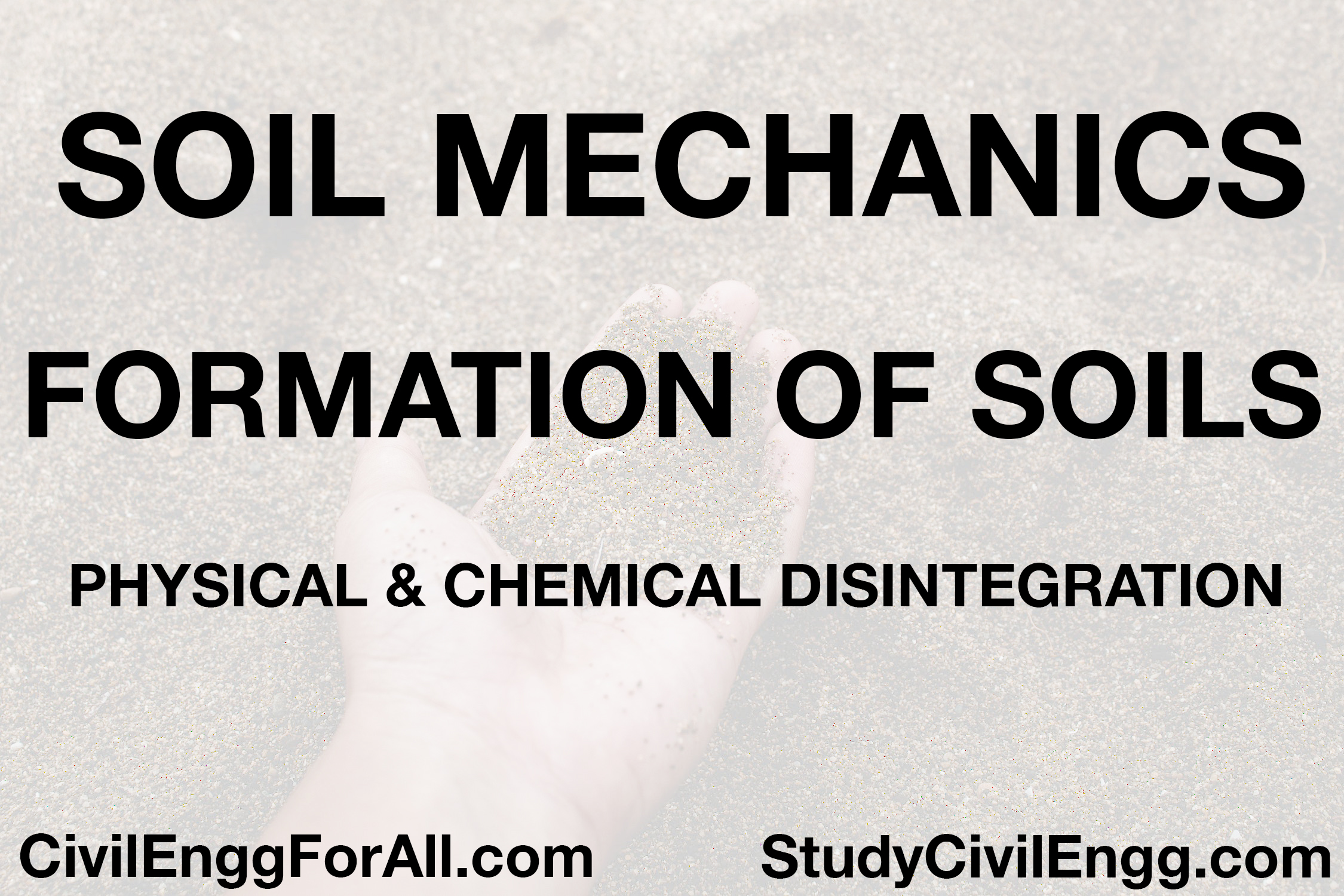FORMATION OF SOILS - SOIL MECHANICS (StudyCivilEngg.com)
FORMATION OF SOILS
SUBJECT : SOIL MECHANICS
Soils are formed by weathering of rocks and minerals at or near the earth’s surface by either
- Physical disintegration (or natural or mechanical weathering) due to the action of natural or mechanical agents
- Chemical decomposition (or chemical weathering) due to the action of chemical agents
Physical Disintegration
Physical disintegration (or natural or mechanical weathering) of rocks is caused by the action of natural or mechanical agents through the following processes.
Temperature changes
The temperature changes cause expansion and contraction of rocks due to which they are alternately subjected to stressing and releasing of stresses. When such changes are repeated several times, the rocks are set in a state of fatigue due to which they disintegrate into smaller particles and thus soils are formed.
Abrasion
As water, wind and glaciers move over the rock surface, abrasion and scouring takes place due to which disintegration of rock takes place resulting in the formation of soils.
Wedging action of ice
In very cold climates water present in pores and minute cracks of rocks gets frozen. Since the volume of ice formed is more than that of water, expansion occurs. Due to wedging action of ice formed in pores and cracks large stresses are developed which results in disintegration of rocks into small pieces and formation of soils.
Spreading of roots of plants
The roots of the trees and shrubs growing on the rocks extend into the cracks and fissures of the rocks. As the roots grow they exert forces on the rocks causing their disintegration and resulting in the formation of soils.
By the process of physical disintegration usually coarse grained soils such as gravel and sand are formed. In all the processes of physical disintegration the soil formed has the properties of the parent rock and there is no change in its chemical composition
Chemical Decomposition
Chemical decomposition (or chemical weathering) of rocks is caused by the action of chemical agents through the following processes.
Hydration
In this process water combines chemically with the rock minerals and forms new chemical compounds. The chemical reaction causes a change in volume and decomposition of rock into small particles resulting in the formation of soils.
Carbonation
In this process Carbon-di-oxide in the atmosphere combines with water to form carbonic acid which reacts chemically with rocks and causes their decomposition resulting in the formation of soils.
Oxidation
In this process oxygen in the atmosphere combines chemically with the rock minerals to form oxides resulting in decomposition of rocks and formation of soils.
Leaching
In this process water–soluble rock minerals such as calcium carbonate are dissolved and washed out from the rocks by rainfall or percolating subsurface water, thus resulting in decomposition of rocks and formation of soils.
Hydrolysis
It is a chemical process in which water gets dissociated into H+ and OH– ions. The hydrogen cations replace the metallic ions such as calcium, sodium and potassium present in rock minerals, thereby resulting in decomposition of rocks and formations of soils.
By chemical decomposition clayey soils are formed. In chemical decomposition or chemical weathering of rocks original rock minerals are transformed into new minerals/compounds by chemical reactions. As such the soils formed by chemical decomposition or chemical weathering of rocks do not have the properties of the parent rocks. Chemical decomposition or chemical weathering has the maximum intensity in humid and tropical climates.
FAQs COVERED IN THIS POST
How are soils formed?
What is Physical Disintegration?
What is Chemical Disintegration?
What is Abrasion?
How do soil form due to leaching?
How do soils form due to Hydrolysis?
How do spreading of plant roots forms soil?
RELATED POST : INTRODUCTION & BASIC DEFINITIONS IN SOIL MECHANICS
ALSO READ
SURVEYING - STUDY ONLINE
BUILDING MATERIALS AND CONSTRUCTION - STUDY ONLINE
FLUID MECHANICS - STUDY ONLINE





Post a Comment